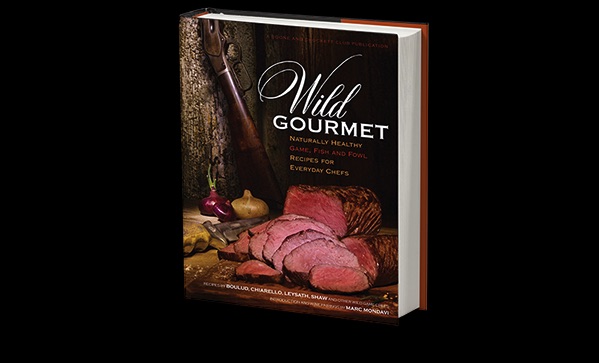What is the most organic, most local, most seasonal way to acquire protein? Easy answer: hunting and fishing. Hobby, sport, or way of life, nothing quite beats earning your meal out in nature.
Of course, making a meal out of a freshly shot deer is a tad different than picking up some cleaned and processed steaks from the grocery store. Enter Wild Gourmet. It’s a cookbook put out by the Boone & Crockett Club. Founded by Teddy Roosevelt, the Boone & Crockett Club has been instrumental in setting up natural parks, regulating hunting, ending the trade of harvested meat, and more. And if you haven’t heard of them, you’ve probably heard of some of their spin-off organisations: Ducks Unlimited, the National Audubon Society, and the New York Zoological Society. And many more. Basically, they’re into two things: conservation and hunting.
All that said, calling Wild Gourmet a cookbook is slightly disingenuous of me. It’s more than a cookbook. Wild Gourmet is easily one of the most thoughtful culinary books ever assembled. Hyperbole much? I don’t think so—this past year I’ve read over two dozen cookbooks (like Smoke) and other food books (like Prophets of Smoked Meat), and I think that Wild Gourmet is one of the most thoughtful, and more to the point, useful, culinary books out there.
Roughly, Wild Gourmet can be divided into two major sections with a generous number of odd bits. The first half features recipes written by the likes of Daniel Boulud, Hank Snow, Emeril Lagasse, and other heavy hitters in the food industry. The second half is all about processing wild game.
Things I like about the cookbook section: plenty of animals are included, like elk, squirrel, and wild boar, ingredients are bold and a different colour in the directions, rough cook times are included, they include options like subbing rabbit for squirrel, they tell you what won’t work as a substitute, each recipe has suggested wine parings, recipes are carefully written (e.g., “. . . but remember this is a dry stew, not a soup. I eat it with a fork and piece of bread,”), and the recipes range from very easy to very involved. One of the recipes I tried, duck soup with riebele dumplings, happens to be online. And you don’t have to shoot your own duck, know that everything can be bought, if you haven’t caught the hunting bug yet. Try this recipe and you’ll buy this book.
Things I like about the processing section: lots of attention to detail, especially food safety detail, lots of instructions to field-dress your game, lists of all the equipment you’ll need, step-by-step pictures of processing fish and game, including squirrel, salmon, and elk. This section is mainly pictures, allowing you to easily follow along with your own processing. Dad didn’t teach you to gut a fish? Not a problem. And most importantly, they detail how to use everything. You aren’t throwing away those duck tongues, son.
Finally, the miscellany. Aside from all the previous good stuff (and lots of hunger-inducing pictures), there are details on recommended cooking techniques, a table that lists species and cuts next to what techniques work best, a nutritional comparison of common wild animals and their farmed equivalents, detailed nutritional information on lots of wild animals, a list of some animals where nutritional information is lacking, information on some of Boone & Crockett’s other activities from cooking to hunting to conservation, and a meat poster that divides things like venison and turkey into sub-primals and cuts.
I wish more cookbooks were as carefully written and as thorough as Wild Gourmet. The kitchen would be less disastrous and more people would give cooking from scratch a try. As for me, I’m looking up places to find wild boar in Canada. I just happen to have a few recipes.
Dave Robson is the editor of DailyXY. He spends his time reading books, drinking Scotch, and smoking cigars.


